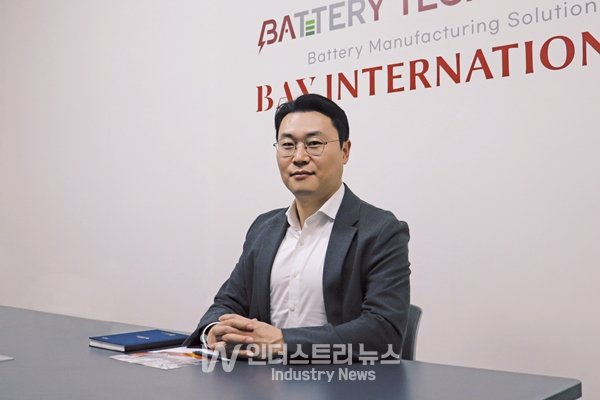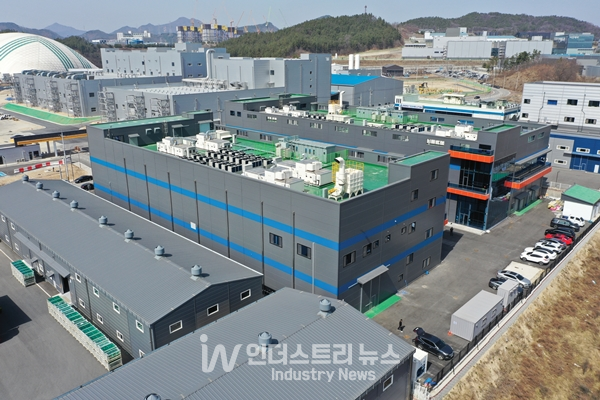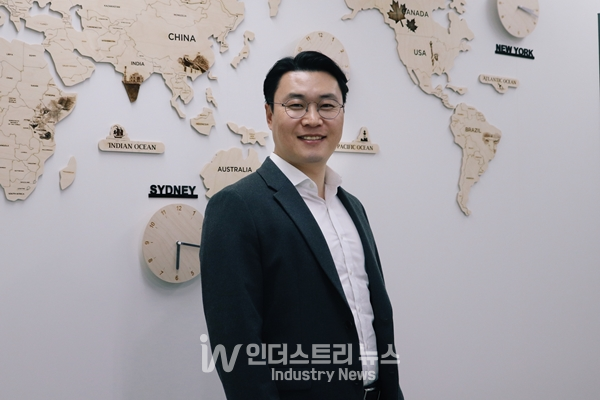News
Bay International CEO Brian Jo, “K-Battery manufacturing capabilities... We plan to expand and develop in Europe and North America.”
Reporter Lee Geon-oh
Approved 2023.12.27 14:00
Creating Pilot Lines for Battery R&D and Offering Process-specific Solutions - Source: Industry News
[Industry News Reporter Lee Geon-oh] As the secondary battery industry is growing significantly, major countries around the world, including Europe and North America, are paying attention to K-batteries. In addition to leading domestic battery cell manufacturers, many companies across the entire value chain of materials, parts, and equipment are receiving attention from overseas markets. The intention behind this is to enter the competition for leadership in the secondary battery industry, a promising future industry, by transfusing the world's best Korean battery technology.
It is an opportunity and optimal timing to expand beyond the small domestic market and into overseas markets, but there are many obstacles to overcome in carrying out the project. There are many complex and difficult tasks, from initial setup to production line design, equipment sourcing, and yield management. Communication must also occur smoothly at all these stages. There are limits to what one sector or company within the value chain can pursue independently.
This magazine met with In-Hwan Cho, CEO of Bay International, which provides process-specific solutions for the construction of initial pilot lines for European battery cell manufacturers and discussed various topics, including secondary battery-related business details, market trends, and future business strategies.

Bay International CEO Jo In-Hwan [Photo = Industry News]
CEO Brian Jo said, “Bay International, started as a sourcing and trading corporation specializing in secondary battery materials, components, and equipment. However, we are also providing technical consulting for the construction of battery production lines based on engineering services through our subsidiary Bay Technology.” He added, “We are serving customers in Europe and North America. “We are providing process-specific solutions through battery research and development (R&D) and technical expertise optimized for the initial pilot line.”
He added, “Beyond simply selling products and services, we are meeting the needs of our customers by collaborating on all stages from initial factory setting to production line operation and sample and prototype production through Project Management (PM).”
What are some representative examples of global collaboration related to batteries?
We are currently pursuing a project in collaboration with Company M, which is building a battery factory with an annual capacity of 42GWh in Northern Europe. This project is to build a pilot line factory in Korea and establish an optimal production system for mass production, from battery cell development to equipment and yield stabilization and material testing.
We are also collaborating with leading battery research institutes and startups in the United States and Canada to provide customized material, component, and equipment solutions. Specifically, materials and parts are outsourced based on data established through the company's direct-use experience and evaluation system, and the business is promoted by collaborating with professional manufacturers or producing facilities directly, depending on the project size.
What do you hope your customers will gain from these solutions?
The successful establishment of their project. We quickly transfer our world-class K-battery technological expertise and help our customers operate an optimized line suited to their environment. To gain an edge in the competitive battery market, we help them make initial settings quickly and accurately while reducing unnecessary costs, so that they can achieve rapid mass production. We hope that our customers can produce excellent batteries, create products that consumers can trust and use, and further contribute to the sustainable energy transition.

Bay International factory view[Photo = Bay International]
Designing and managing the entire battery manufacturing line seems quite difficult. What is Bay International’s unique competitiveness and differentiation?
In Korea, China, and Japan, which are leading the global secondary battery industry, there are many companies with highly specialized and outstanding technological capabilities. Bay International started as a secondary battery specialized trading business and had many opportunities to collaborate with the best manufacturing companies in each process.
We set ourselves apart from trade brokers by offering engineering-based technical sales, acquiring technical expertise for each process, and creating a turnkey solutions system for materials, parts, and equipment. We have continuously strengthened our technical sales and quickly formed a team of skilled professionals to manage overseas projects with a one-stop solution, from A to Z.
Another differentiating factor could be our ability to design, with specifications and types tailored to the customer, utilizing data-based technical capabilities gained through various experiences. It can be considered a specialization in R&D and pilot lines, which are relatively small projects.
Why do you think North America and Europe are paying attention to K-Battery?
The battery industry is receiving a lot of attention due to the rapidly growing electric vehicles and electrification issues, and I think the reason that K-Batteries are attracting the most attention is their experience. As a new start-up, one cannot help but be interested in Korea's mass production experience accumulated through unrivaled technological capabilities.
For example, high-nickel cathode material technology, which has a high entry barrier, and requires decades of process equipment knowledge is among our strengths that other countries can’t easily match. We believe that these factors influence battery mass production yield.

Bay International CEO Cho In-hwan said, “We support unnecessary cost reduction and quick and accurate initial setup to achieve rapid
mass production in the competitive battery market.” [Photo = Industry News]
Collaboration with domestic small and medium-sized manufacturing companies will also be an important competitive advantage.
Yes. We believe that a partnership with a strong trusting relationship is more important than anything else, and that smooth collaboration with companies specializing in each field is an essential element in winning project orders and continuing business expansion. This relationship has a significant impact on product quality improvement, timely delivery, cost reduction, and innovation; it serves as a foundation for mutual growth. In addition, competitiveness can be further increased by having an optimal cooperation model in response to the needs of a rapidly changing market.
Do you have any plans or mid- to long-term goals for next year?
Despite being only three years old, our company is achieving rapid sales growth. Last December, we received recognition as the top venture enterprise, certified for export, and were awarded a commendation from the Minister of Trade Industry and Energy. We plan to move out of the leased factory we are currently using and establish our own factory and are in the process of attracting external investment for operation.
We are pursuing the establishment of a technical support service center in Europe and North America to ensure rapid response. Local experts and skilled Korean technicians will work together to provide the best service. Furthermore, we intend to establish a global R&D hub to provide comprehensive support to our customers, including material development, cell design, and process development research for next-generation secondary batteries.
Source: Industry News (http://www.industrynews.co.kr)


 Brian_Interview_photo.jpg (287.7KB),
Download:43
Brian_Interview_photo.jpg (287.7KB),
Download:43